Analysis of External Business Environment: UK Hospitality Sector
VerifiedAdded on 2019/12/03
|22
|6743
|74
Report
AI Summary
This report provides a detailed analysis of the external business environment within the UK hospitality industry, using InterContinental Hotels Group (IHG) as a primary case study. The report begins by discussing the structure and operation of the UK economy, including its historical context and current standing in the global market, emphasizing the significance of the service sector. It then delves into income, wealth, employment, and occupational distribution, highlighting the influence of economic policies and demographic trends on employment patterns within the hospitality sector. The report further examines the role and influence of the local government, EU regulations, and pressure groups, as well as the legal framework affecting business operations. Additionally, it explores different types of businesses in the hospitality sector, the legal processes for company formation and dissolution, and the organizational structures within registered companies. The report concludes with a comprehensive overview of the external factors impacting the UK hospitality industry, offering valuable insights into the challenges and opportunities faced by businesses like IHG.

External business environment
Paraphrase This Document
Need a fresh take? Get an instant paraphrase of this document with our AI Paraphraser
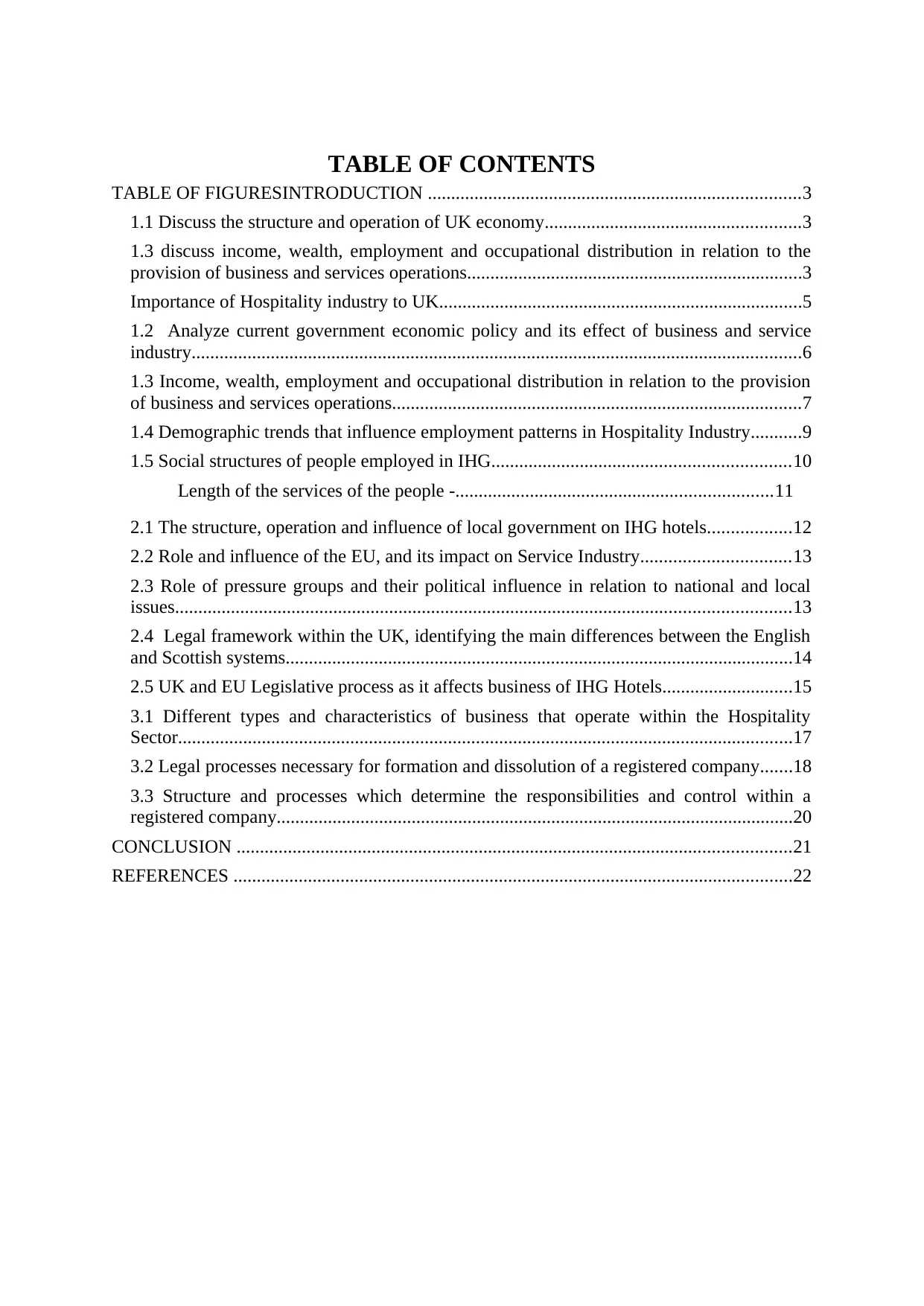
TABLE OF CONTENTS
TABLE OF FIGURESINTRODUCTION ................................................................................3
1.1 Discuss the structure and operation of UK economy.......................................................3
1.3 discuss income, wealth, employment and occupational distribution in relation to the
provision of business and services operations........................................................................3
Importance of Hospitality industry to UK..............................................................................5
1.2 Analyze current government economic policy and its effect of business and service
industry...................................................................................................................................6
1.3 Income, wealth, employment and occupational distribution in relation to the provision
of business and services operations........................................................................................7
1.4 Demographic trends that influence employment patterns in Hospitality Industry...........9
1.5 Social structures of people employed in IHG................................................................10
Length of the services of the people -....................................................................11
2.1 The structure, operation and influence of local government on IHG hotels..................12
2.2 Role and influence of the EU, and its impact on Service Industry................................13
2.3 Role of pressure groups and their political influence in relation to national and local
issues....................................................................................................................................13
2.4 Legal framework within the UK, identifying the main differences between the English
and Scottish systems.............................................................................................................14
2.5 UK and EU Legislative process as it affects business of IHG Hotels............................15
3.1 Different types and characteristics of business that operate within the Hospitality
Sector....................................................................................................................................17
3.2 Legal processes necessary for formation and dissolution of a registered company.......18
3.3 Structure and processes which determine the responsibilities and control within a
registered company...............................................................................................................20
CONCLUSION .......................................................................................................................21
REFERENCES ........................................................................................................................22
TABLE OF FIGURESINTRODUCTION ................................................................................3
1.1 Discuss the structure and operation of UK economy.......................................................3
1.3 discuss income, wealth, employment and occupational distribution in relation to the
provision of business and services operations........................................................................3
Importance of Hospitality industry to UK..............................................................................5
1.2 Analyze current government economic policy and its effect of business and service
industry...................................................................................................................................6
1.3 Income, wealth, employment and occupational distribution in relation to the provision
of business and services operations........................................................................................7
1.4 Demographic trends that influence employment patterns in Hospitality Industry...........9
1.5 Social structures of people employed in IHG................................................................10
Length of the services of the people -....................................................................11
2.1 The structure, operation and influence of local government on IHG hotels..................12
2.2 Role and influence of the EU, and its impact on Service Industry................................13
2.3 Role of pressure groups and their political influence in relation to national and local
issues....................................................................................................................................13
2.4 Legal framework within the UK, identifying the main differences between the English
and Scottish systems.............................................................................................................14
2.5 UK and EU Legislative process as it affects business of IHG Hotels............................15
3.1 Different types and characteristics of business that operate within the Hospitality
Sector....................................................................................................................................17
3.2 Legal processes necessary for formation and dissolution of a registered company.......18
3.3 Structure and processes which determine the responsibilities and control within a
registered company...............................................................................................................20
CONCLUSION .......................................................................................................................21
REFERENCES ........................................................................................................................22
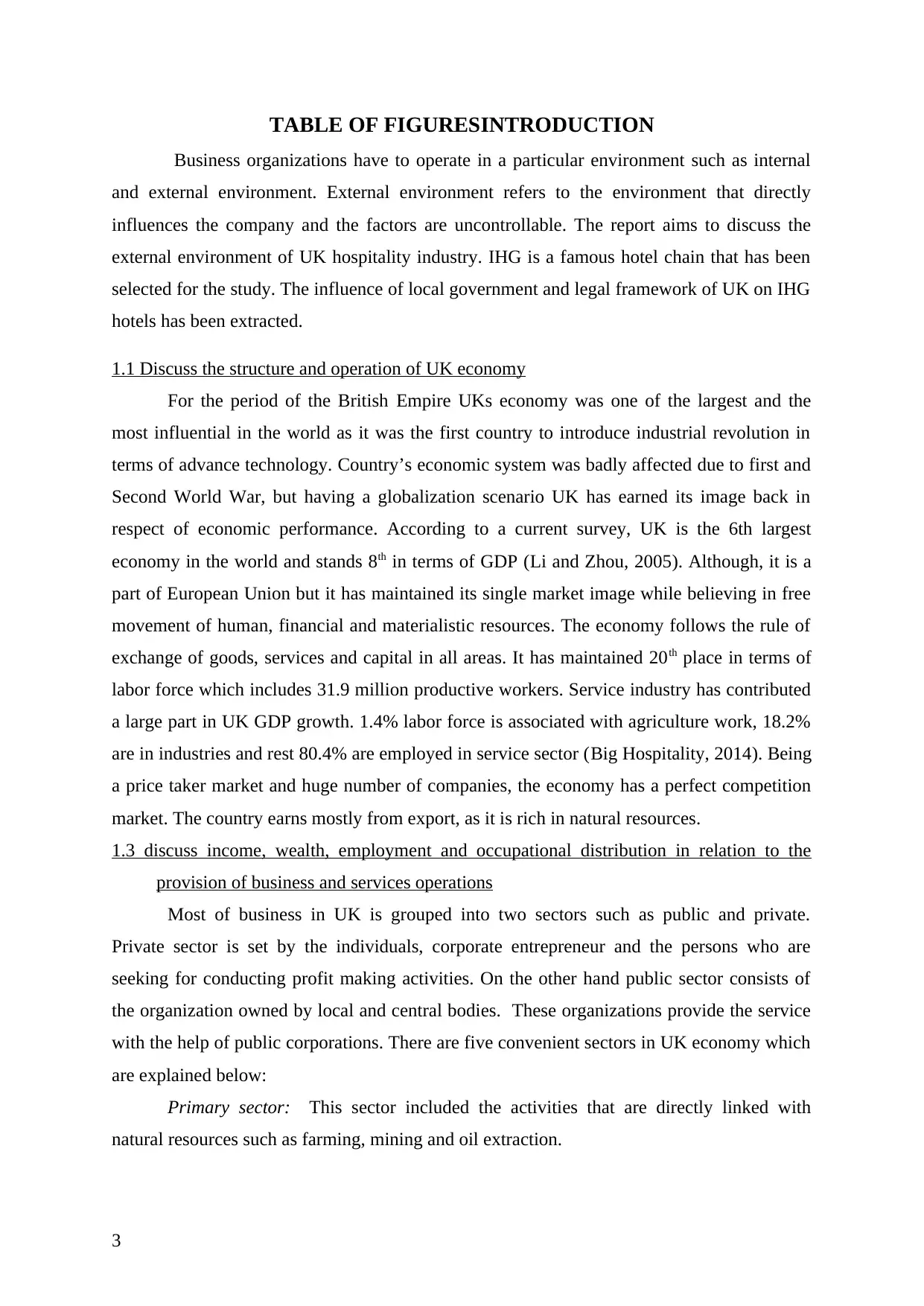
TABLE OF FIGURESINTRODUCTION
Business organizations have to operate in a particular environment such as internal
and external environment. External environment refers to the environment that directly
influences the company and the factors are uncontrollable. The report aims to discuss the
external environment of UK hospitality industry. IHG is a famous hotel chain that has been
selected for the study. The influence of local government and legal framework of UK on IHG
hotels has been extracted.
1.1 Discuss the structure and operation of UK economy
For the period of the British Empire UKs economy was one of the largest and the
most influential in the world as it was the first country to introduce industrial revolution in
terms of advance technology. Country’s economic system was badly affected due to first and
Second World War, but having a globalization scenario UK has earned its image back in
respect of economic performance. According to a current survey, UK is the 6th largest
economy in the world and stands 8th in terms of GDP (Li and Zhou, 2005). Although, it is a
part of European Union but it has maintained its single market image while believing in free
movement of human, financial and materialistic resources. The economy follows the rule of
exchange of goods, services and capital in all areas. It has maintained 20th place in terms of
labor force which includes 31.9 million productive workers. Service industry has contributed
a large part in UK GDP growth. 1.4% labor force is associated with agriculture work, 18.2%
are in industries and rest 80.4% are employed in service sector (Big Hospitality, 2014). Being
a price taker market and huge number of companies, the economy has a perfect competition
market. The country earns mostly from export, as it is rich in natural resources.
1.3 discuss income, wealth, employment and occupational distribution in relation to the
provision of business and services operations
Most of business in UK is grouped into two sectors such as public and private.
Private sector is set by the individuals, corporate entrepreneur and the persons who are
seeking for conducting profit making activities. On the other hand public sector consists of
the organization owned by local and central bodies. These organizations provide the service
with the help of public corporations. There are five convenient sectors in UK economy which
are explained below:
Primary sector: This sector included the activities that are directly linked with
natural resources such as farming, mining and oil extraction.
3
Business organizations have to operate in a particular environment such as internal
and external environment. External environment refers to the environment that directly
influences the company and the factors are uncontrollable. The report aims to discuss the
external environment of UK hospitality industry. IHG is a famous hotel chain that has been
selected for the study. The influence of local government and legal framework of UK on IHG
hotels has been extracted.
1.1 Discuss the structure and operation of UK economy
For the period of the British Empire UKs economy was one of the largest and the
most influential in the world as it was the first country to introduce industrial revolution in
terms of advance technology. Country’s economic system was badly affected due to first and
Second World War, but having a globalization scenario UK has earned its image back in
respect of economic performance. According to a current survey, UK is the 6th largest
economy in the world and stands 8th in terms of GDP (Li and Zhou, 2005). Although, it is a
part of European Union but it has maintained its single market image while believing in free
movement of human, financial and materialistic resources. The economy follows the rule of
exchange of goods, services and capital in all areas. It has maintained 20th place in terms of
labor force which includes 31.9 million productive workers. Service industry has contributed
a large part in UK GDP growth. 1.4% labor force is associated with agriculture work, 18.2%
are in industries and rest 80.4% are employed in service sector (Big Hospitality, 2014). Being
a price taker market and huge number of companies, the economy has a perfect competition
market. The country earns mostly from export, as it is rich in natural resources.
1.3 discuss income, wealth, employment and occupational distribution in relation to the
provision of business and services operations
Most of business in UK is grouped into two sectors such as public and private.
Private sector is set by the individuals, corporate entrepreneur and the persons who are
seeking for conducting profit making activities. On the other hand public sector consists of
the organization owned by local and central bodies. These organizations provide the service
with the help of public corporations. There are five convenient sectors in UK economy which
are explained below:
Primary sector: This sector included the activities that are directly linked with
natural resources such as farming, mining and oil extraction.
3
⊘ This is a preview!⊘
Do you want full access?
Subscribe today to unlock all pages.

Trusted by 1+ million students worldwide
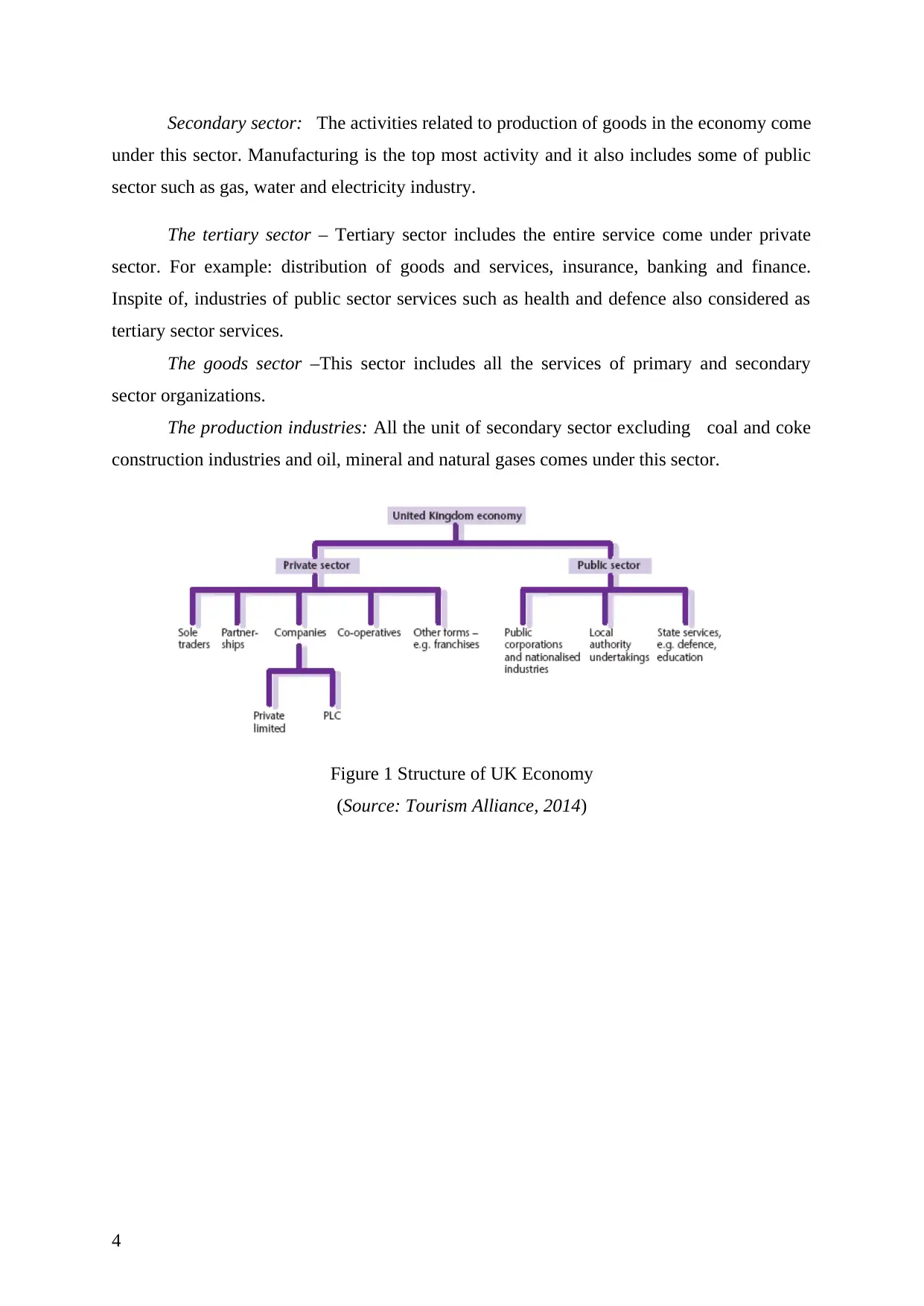
Secondary sector: The activities related to production of goods in the economy come
under this sector. Manufacturing is the top most activity and it also includes some of public
sector such as gas, water and electricity industry.
The tertiary sector – Tertiary sector includes the entire service come under private
sector. For example: distribution of goods and services, insurance, banking and finance.
Inspite of, industries of public sector services such as health and defence also considered as
tertiary sector services.
The goods sector –This sector includes all the services of primary and secondary
sector organizations.
The production industries: All the unit of secondary sector excluding coal and coke
construction industries and oil, mineral and natural gases comes under this sector.
Figure 1 Structure of UK Economy
(Source: Tourism Alliance, 2014)
4
under this sector. Manufacturing is the top most activity and it also includes some of public
sector such as gas, water and electricity industry.
The tertiary sector – Tertiary sector includes the entire service come under private
sector. For example: distribution of goods and services, insurance, banking and finance.
Inspite of, industries of public sector services such as health and defence also considered as
tertiary sector services.
The goods sector –This sector includes all the services of primary and secondary
sector organizations.
The production industries: All the unit of secondary sector excluding coal and coke
construction industries and oil, mineral and natural gases comes under this sector.
Figure 1 Structure of UK Economy
(Source: Tourism Alliance, 2014)
4
Paraphrase This Document
Need a fresh take? Get an instant paraphrase of this document with our AI Paraphraser
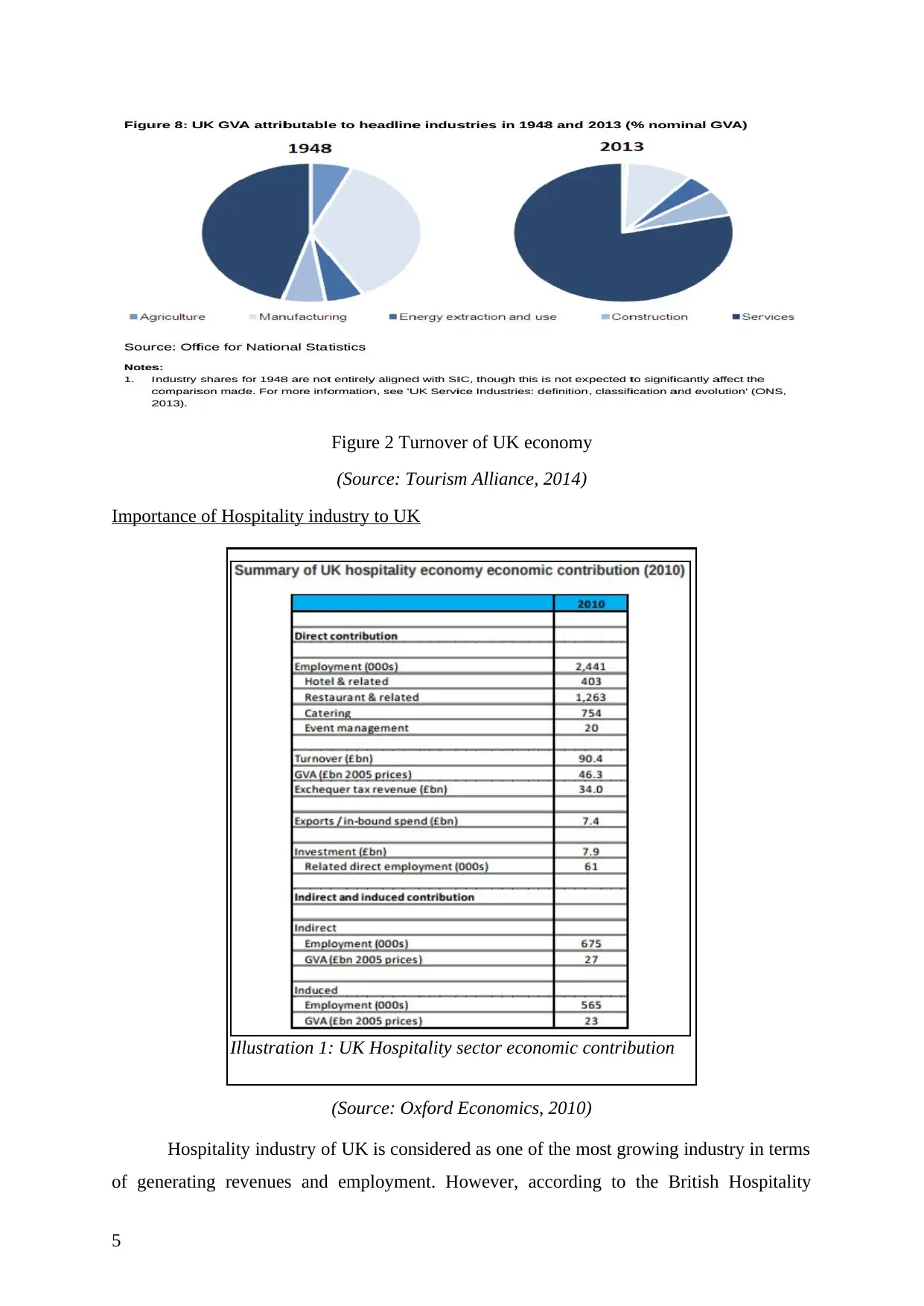
Figure 2 Turnover of UK economy
(Source: Tourism Alliance, 2014)
Importance of Hospitality industry to UK
(Source: Oxford Economics, 2010)
Hospitality industry of UK is considered as one of the most growing industry in terms
of generating revenues and employment. However, according to the British Hospitality
5
Illustration 1: UK Hospitality sector economic contribution
(Source: Tourism Alliance, 2014)
Importance of Hospitality industry to UK
(Source: Oxford Economics, 2010)
Hospitality industry of UK is considered as one of the most growing industry in terms
of generating revenues and employment. However, according to the British Hospitality
5
Illustration 1: UK Hospitality sector economic contribution
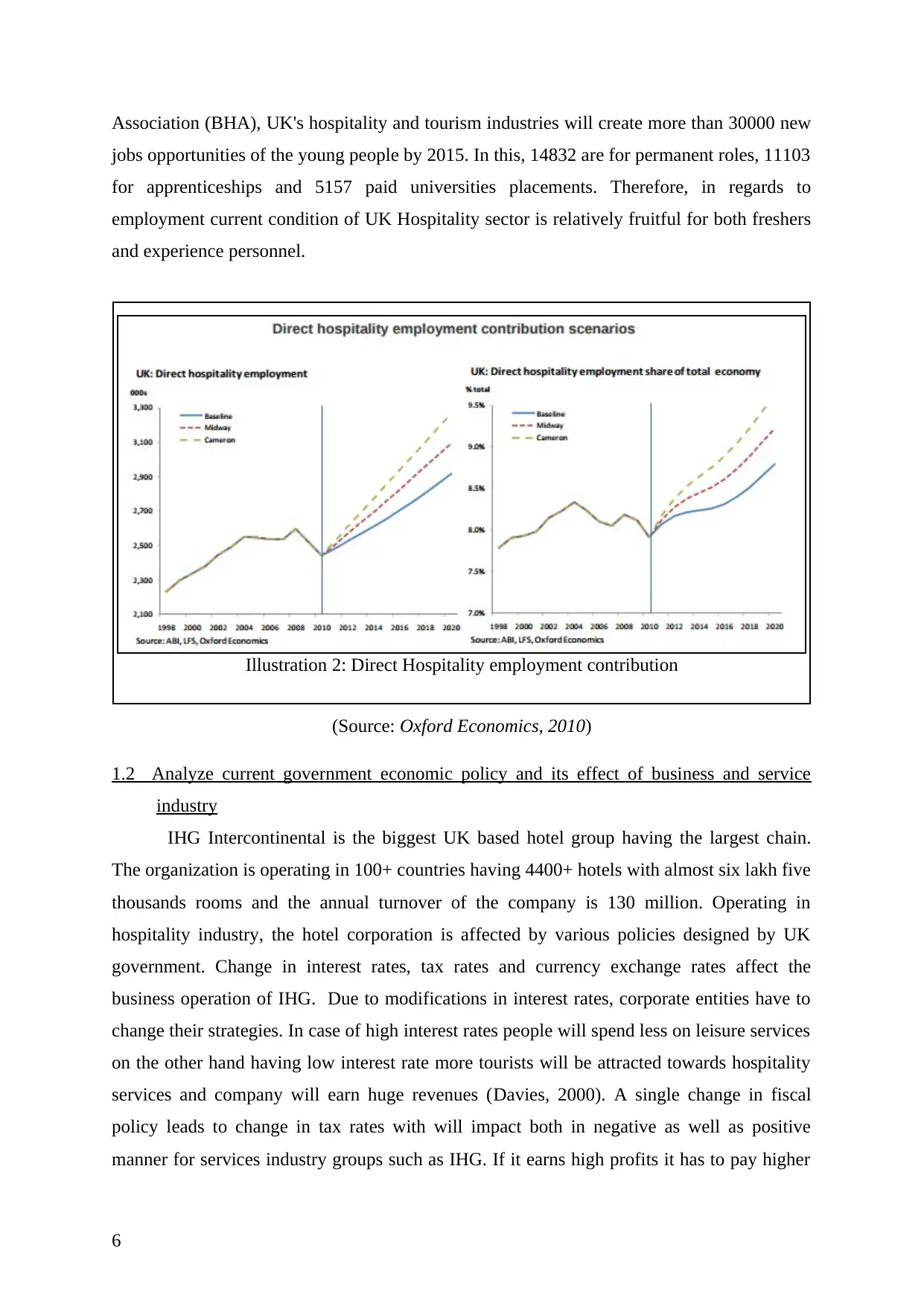
Association (BHA), UK's hospitality and tourism industries will create more than 30000 new
jobs opportunities of the young people by 2015. In this, 14832 are for permanent roles, 11103
for apprenticeships and 5157 paid universities placements. Therefore, in regards to
employment current condition of UK Hospitality sector is relatively fruitful for both freshers
and experience personnel.
(Source: Oxford Economics, 2010)
1.2 Analyze current government economic policy and its effect of business and service
industry
IHG Intercontinental is the biggest UK based hotel group having the largest chain.
The organization is operating in 100+ countries having 4400+ hotels with almost six lakh five
thousands rooms and the annual turnover of the company is 130 million. Operating in
hospitality industry, the hotel corporation is affected by various policies designed by UK
government. Change in interest rates, tax rates and currency exchange rates affect the
business operation of IHG. Due to modifications in interest rates, corporate entities have to
change their strategies. In case of high interest rates people will spend less on leisure services
on the other hand having low interest rate more tourists will be attracted towards hospitality
services and company will earn huge revenues (Davies, 2000). A single change in fiscal
policy leads to change in tax rates with will impact both in negative as well as positive
manner for services industry groups such as IHG. If it earns high profits it has to pay higher
6
Illustration 2: Direct Hospitality employment contribution
jobs opportunities of the young people by 2015. In this, 14832 are for permanent roles, 11103
for apprenticeships and 5157 paid universities placements. Therefore, in regards to
employment current condition of UK Hospitality sector is relatively fruitful for both freshers
and experience personnel.
(Source: Oxford Economics, 2010)
1.2 Analyze current government economic policy and its effect of business and service
industry
IHG Intercontinental is the biggest UK based hotel group having the largest chain.
The organization is operating in 100+ countries having 4400+ hotels with almost six lakh five
thousands rooms and the annual turnover of the company is 130 million. Operating in
hospitality industry, the hotel corporation is affected by various policies designed by UK
government. Change in interest rates, tax rates and currency exchange rates affect the
business operation of IHG. Due to modifications in interest rates, corporate entities have to
change their strategies. In case of high interest rates people will spend less on leisure services
on the other hand having low interest rate more tourists will be attracted towards hospitality
services and company will earn huge revenues (Davies, 2000). A single change in fiscal
policy leads to change in tax rates with will impact both in negative as well as positive
manner for services industry groups such as IHG. If it earns high profits it has to pay higher
6
Illustration 2: Direct Hospitality employment contribution
⊘ This is a preview!⊘
Do you want full access?
Subscribe today to unlock all pages.

Trusted by 1+ million students worldwide
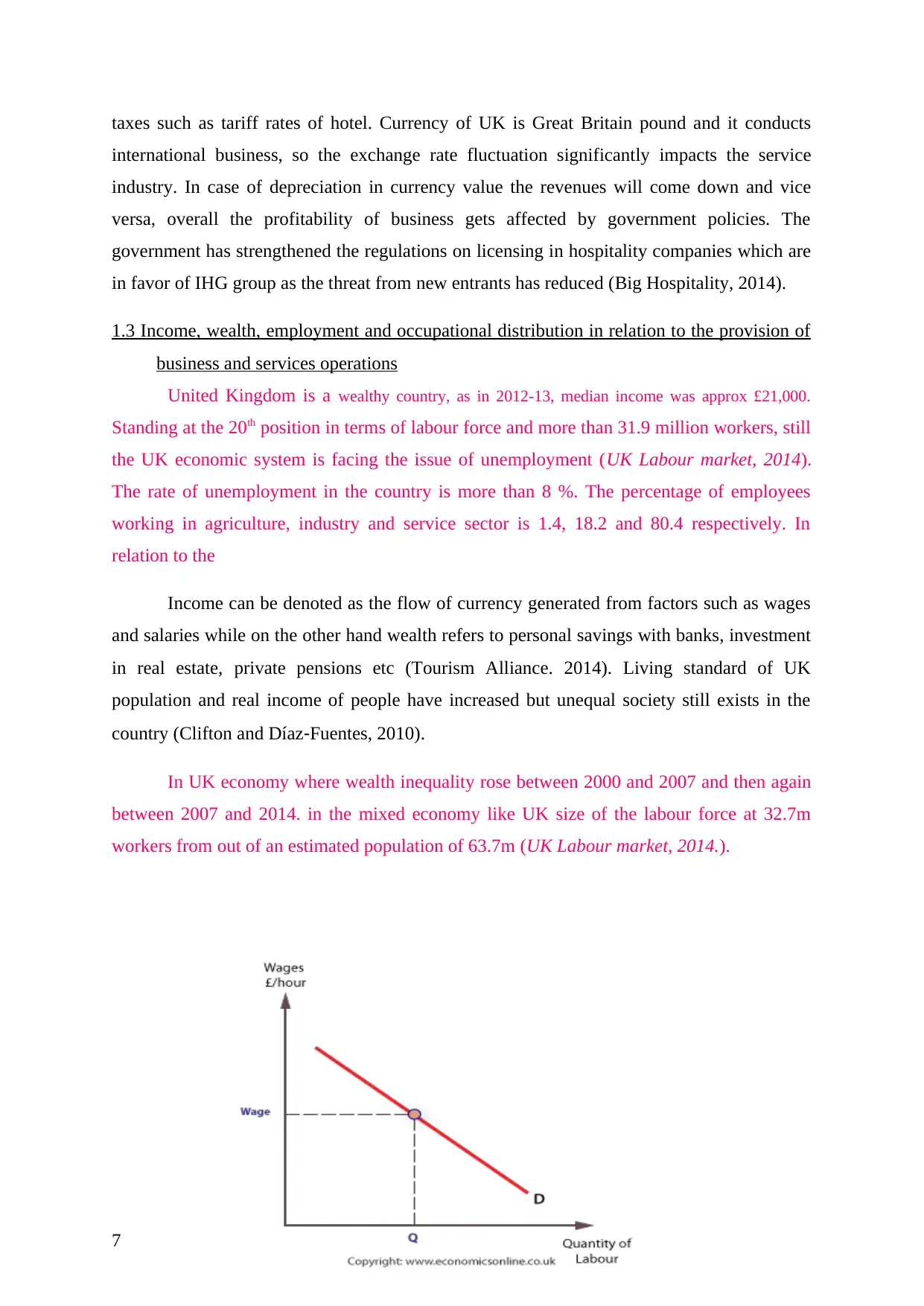
taxes such as tariff rates of hotel. Currency of UK is Great Britain pound and it conducts
international business, so the exchange rate fluctuation significantly impacts the service
industry. In case of depreciation in currency value the revenues will come down and vice
versa, overall the profitability of business gets affected by government policies. The
government has strengthened the regulations on licensing in hospitality companies which are
in favor of IHG group as the threat from new entrants has reduced (Big Hospitality, 2014).
1.3 Income, wealth, employment and occupational distribution in relation to the provision of
business and services operations
United Kingdom is a wealthy country, as in 2012-13, median income was approx £21,000.
Standing at the 20th position in terms of labour force and more than 31.9 million workers, still
the UK economic system is facing the issue of unemployment (UK Labour market, 2014).
The rate of unemployment in the country is more than 8 %. The percentage of employees
working in agriculture, industry and service sector is 1.4, 18.2 and 80.4 respectively. In
relation to the
Income can be denoted as the flow of currency generated from factors such as wages
and salaries while on the other hand wealth refers to personal savings with banks, investment
in real estate, private pensions etc (Tourism Alliance. 2014). Living standard of UK
population and real income of people have increased but unequal society still exists in the
country (Clifton and Díaz‐Fuentes, 2010).
In UK economy where wealth inequality rose between 2000 and 2007 and then again
between 2007 and 2014. in the mixed economy like UK size of the labour force at 32.7m
workers from out of an estimated population of 63.7m (UK Labour market, 2014.).
7
international business, so the exchange rate fluctuation significantly impacts the service
industry. In case of depreciation in currency value the revenues will come down and vice
versa, overall the profitability of business gets affected by government policies. The
government has strengthened the regulations on licensing in hospitality companies which are
in favor of IHG group as the threat from new entrants has reduced (Big Hospitality, 2014).
1.3 Income, wealth, employment and occupational distribution in relation to the provision of
business and services operations
United Kingdom is a wealthy country, as in 2012-13, median income was approx £21,000.
Standing at the 20th position in terms of labour force and more than 31.9 million workers, still
the UK economic system is facing the issue of unemployment (UK Labour market, 2014).
The rate of unemployment in the country is more than 8 %. The percentage of employees
working in agriculture, industry and service sector is 1.4, 18.2 and 80.4 respectively. In
relation to the
Income can be denoted as the flow of currency generated from factors such as wages
and salaries while on the other hand wealth refers to personal savings with banks, investment
in real estate, private pensions etc (Tourism Alliance. 2014). Living standard of UK
population and real income of people have increased but unequal society still exists in the
country (Clifton and Díaz‐Fuentes, 2010).
In UK economy where wealth inequality rose between 2000 and 2007 and then again
between 2007 and 2014. in the mixed economy like UK size of the labour force at 32.7m
workers from out of an estimated population of 63.7m (UK Labour market, 2014.).
7
Paraphrase This Document
Need a fresh take? Get an instant paraphrase of this document with our AI Paraphraser
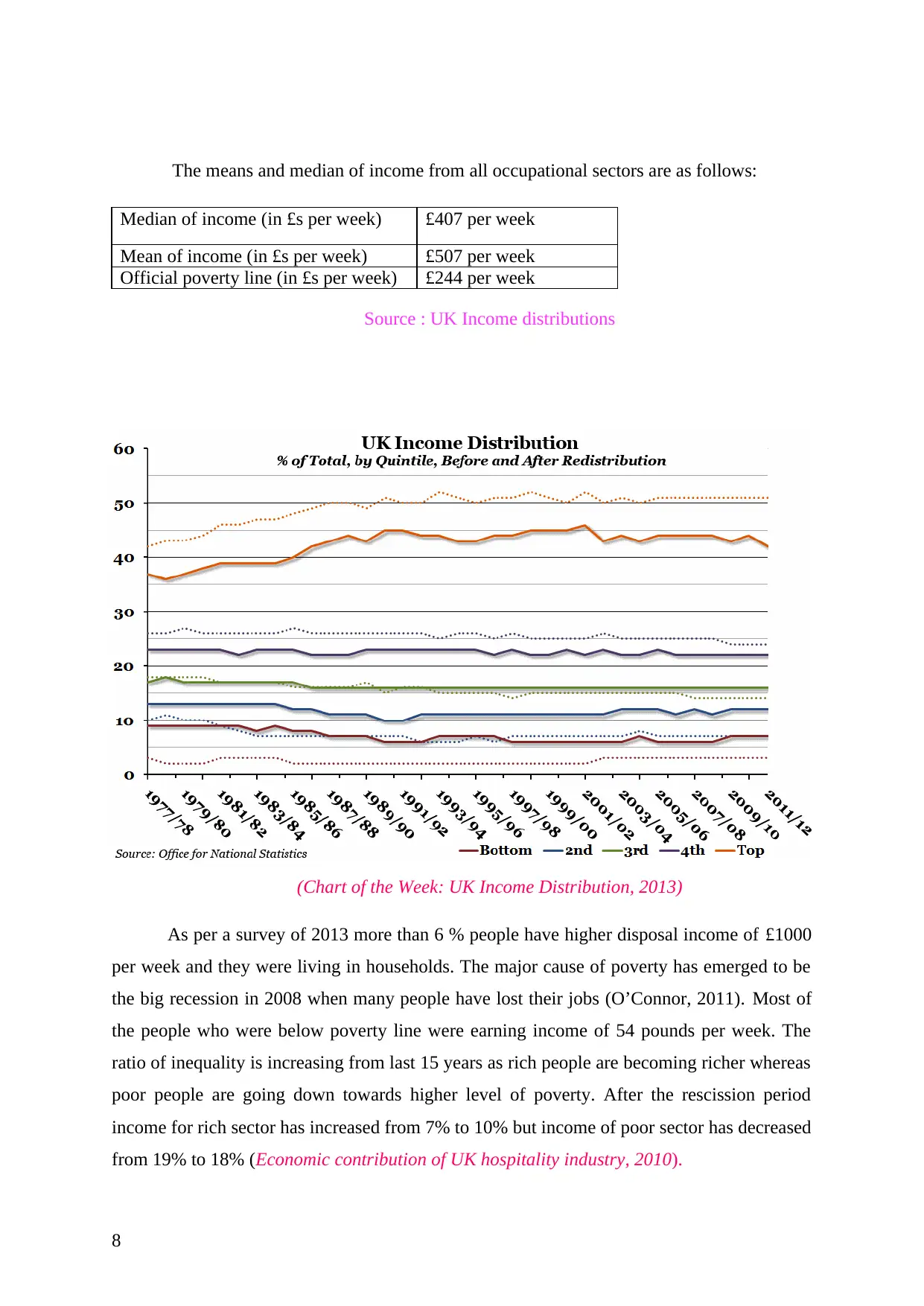
The means and median of income from all occupational sectors are as follows:
Median of income (in £s per week) £407 per week
Mean of income (in £s per week) £507 per week
Official poverty line (in £s per week) £244 per week
Source : UK Income distributions
(Chart of the Week: UK Income Distribution, 2013)
As per a survey of 2013 more than 6 % people have higher disposal income of £1000
per week and they were living in households. The major cause of poverty has emerged to be
the big recession in 2008 when many people have lost their jobs (O’Connor, 2011). Most of
the people who were below poverty line were earning income of 54 pounds per week. The
ratio of inequality is increasing from last 15 years as rich people are becoming richer whereas
poor people are going down towards higher level of poverty. After the rescission period
income for rich sector has increased from 7% to 10% but income of poor sector has decreased
from 19% to 18% (Economic contribution of UK hospitality industry, 2010).
8
Median of income (in £s per week) £407 per week
Mean of income (in £s per week) £507 per week
Official poverty line (in £s per week) £244 per week
Source : UK Income distributions
(Chart of the Week: UK Income Distribution, 2013)
As per a survey of 2013 more than 6 % people have higher disposal income of £1000
per week and they were living in households. The major cause of poverty has emerged to be
the big recession in 2008 when many people have lost their jobs (O’Connor, 2011). Most of
the people who were below poverty line were earning income of 54 pounds per week. The
ratio of inequality is increasing from last 15 years as rich people are becoming richer whereas
poor people are going down towards higher level of poverty. After the rescission period
income for rich sector has increased from 7% to 10% but income of poor sector has decreased
from 19% to 18% (Economic contribution of UK hospitality industry, 2010).
8
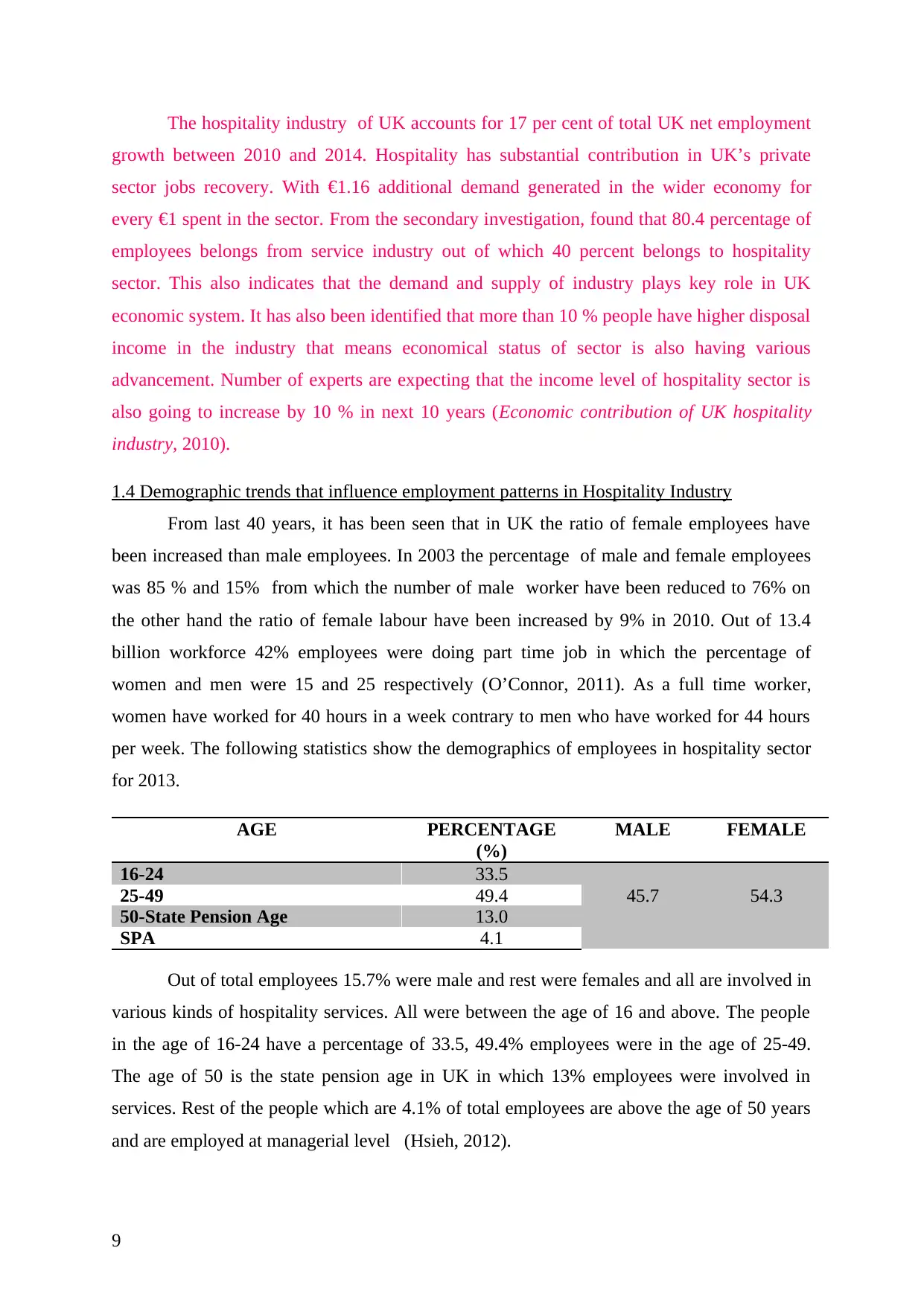
The hospitality industry of UK accounts for 17 per cent of total UK net employment
growth between 2010 and 2014. Hospitality has substantial contribution in UK’s private
sector jobs recovery. With €1.16 additional demand generated in the wider economy for
every €1 spent in the sector. From the secondary investigation, found that 80.4 percentage of
employees belongs from service industry out of which 40 percent belongs to hospitality
sector. This also indicates that the demand and supply of industry plays key role in UK
economic system. It has also been identified that more than 10 % people have higher disposal
income in the industry that means economical status of sector is also having various
advancement. Number of experts are expecting that the income level of hospitality sector is
also going to increase by 10 % in next 10 years (Economic contribution of UK hospitality
industry, 2010).
1.4 Demographic trends that influence employment patterns in Hospitality Industry
From last 40 years, it has been seen that in UK the ratio of female employees have
been increased than male employees. In 2003 the percentage of male and female employees
was 85 % and 15% from which the number of male worker have been reduced to 76% on
the other hand the ratio of female labour have been increased by 9% in 2010. Out of 13.4
billion workforce 42% employees were doing part time job in which the percentage of
women and men were 15 and 25 respectively (O’Connor, 2011). As a full time worker,
women have worked for 40 hours in a week contrary to men who have worked for 44 hours
per week. The following statistics show the demographics of employees in hospitality sector
for 2013.
AGE PERCENTAGE
(%)
MALE FEMALE
16-24 33.5
45.7 54.325-49 49.4
50-State Pension Age 13.0
SPA 4.1
Out of total employees 15.7% were male and rest were females and all are involved in
various kinds of hospitality services. All were between the age of 16 and above. The people
in the age of 16-24 have a percentage of 33.5, 49.4% employees were in the age of 25-49.
The age of 50 is the state pension age in UK in which 13% employees were involved in
services. Rest of the people which are 4.1% of total employees are above the age of 50 years
and are employed at managerial level (Hsieh, 2012).
9
growth between 2010 and 2014. Hospitality has substantial contribution in UK’s private
sector jobs recovery. With €1.16 additional demand generated in the wider economy for
every €1 spent in the sector. From the secondary investigation, found that 80.4 percentage of
employees belongs from service industry out of which 40 percent belongs to hospitality
sector. This also indicates that the demand and supply of industry plays key role in UK
economic system. It has also been identified that more than 10 % people have higher disposal
income in the industry that means economical status of sector is also having various
advancement. Number of experts are expecting that the income level of hospitality sector is
also going to increase by 10 % in next 10 years (Economic contribution of UK hospitality
industry, 2010).
1.4 Demographic trends that influence employment patterns in Hospitality Industry
From last 40 years, it has been seen that in UK the ratio of female employees have
been increased than male employees. In 2003 the percentage of male and female employees
was 85 % and 15% from which the number of male worker have been reduced to 76% on
the other hand the ratio of female labour have been increased by 9% in 2010. Out of 13.4
billion workforce 42% employees were doing part time job in which the percentage of
women and men were 15 and 25 respectively (O’Connor, 2011). As a full time worker,
women have worked for 40 hours in a week contrary to men who have worked for 44 hours
per week. The following statistics show the demographics of employees in hospitality sector
for 2013.
AGE PERCENTAGE
(%)
MALE FEMALE
16-24 33.5
45.7 54.325-49 49.4
50-State Pension Age 13.0
SPA 4.1
Out of total employees 15.7% were male and rest were females and all are involved in
various kinds of hospitality services. All were between the age of 16 and above. The people
in the age of 16-24 have a percentage of 33.5, 49.4% employees were in the age of 25-49.
The age of 50 is the state pension age in UK in which 13% employees were involved in
services. Rest of the people which are 4.1% of total employees are above the age of 50 years
and are employed at managerial level (Hsieh, 2012).
9
⊘ This is a preview!⊘
Do you want full access?
Subscribe today to unlock all pages.

Trusted by 1+ million students worldwide
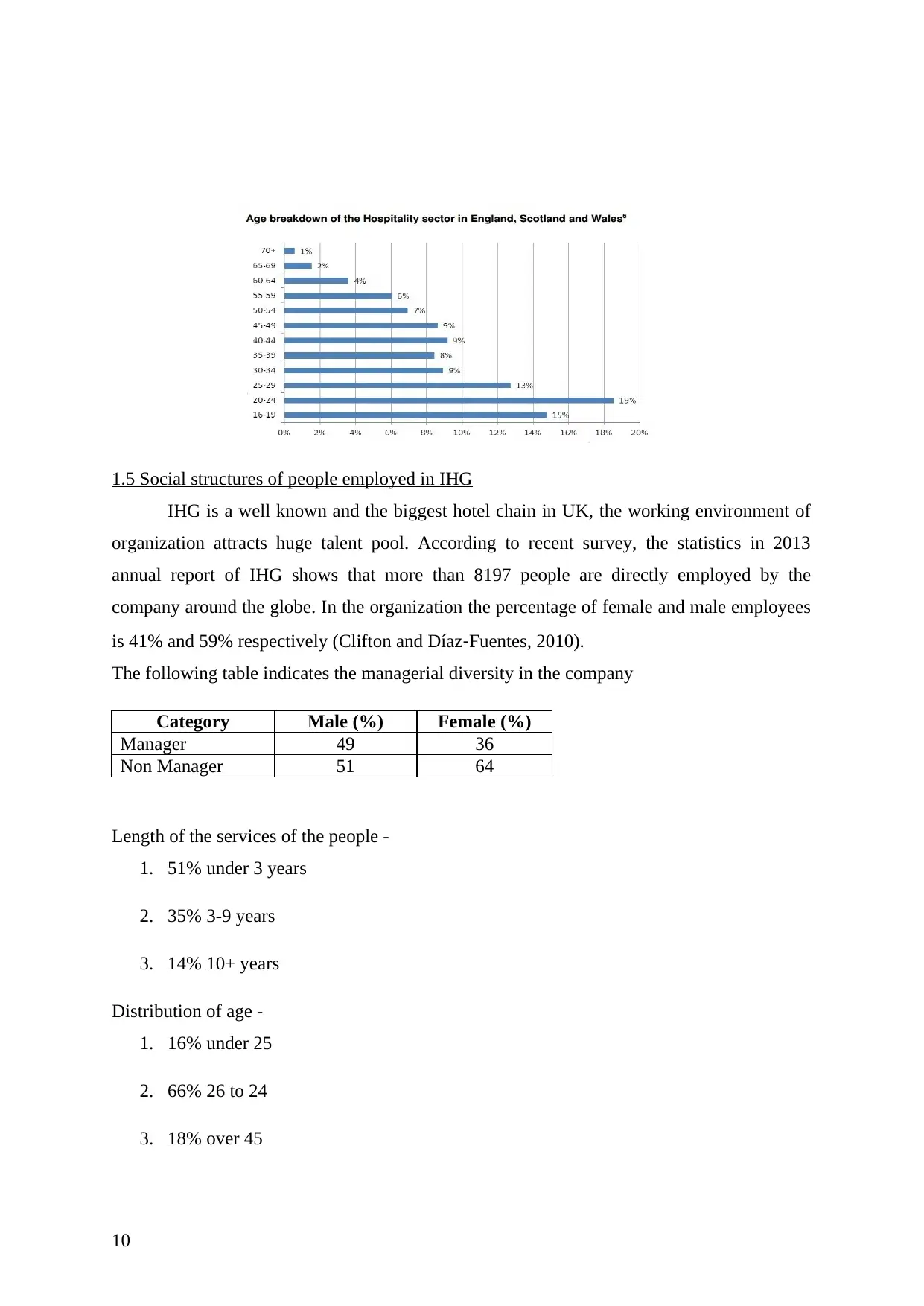
1.5 Social structures of people employed in IHG
IHG is a well known and the biggest hotel chain in UK, the working environment of
organization attracts huge talent pool. According to recent survey, the statistics in 2013
annual report of IHG shows that more than 8197 people are directly employed by the
company around the globe. In the organization the percentage of female and male employees
is 41% and 59% respectively (Clifton and Díaz‐Fuentes, 2010).
The following table indicates the managerial diversity in the company
Category Male (%) Female (%)
Manager 49 36
Non Manager 51 64
Length of the services of the people -
1. 51% under 3 years
2. 35% 3-9 years
3. 14% 10+ years
Distribution of age -
1. 16% under 25
2. 66% 26 to 24
3. 18% over 45
10
IHG is a well known and the biggest hotel chain in UK, the working environment of
organization attracts huge talent pool. According to recent survey, the statistics in 2013
annual report of IHG shows that more than 8197 people are directly employed by the
company around the globe. In the organization the percentage of female and male employees
is 41% and 59% respectively (Clifton and Díaz‐Fuentes, 2010).
The following table indicates the managerial diversity in the company
Category Male (%) Female (%)
Manager 49 36
Non Manager 51 64
Length of the services of the people -
1. 51% under 3 years
2. 35% 3-9 years
3. 14% 10+ years
Distribution of age -
1. 16% under 25
2. 66% 26 to 24
3. 18% over 45
10
Paraphrase This Document
Need a fresh take? Get an instant paraphrase of this document with our AI Paraphraser
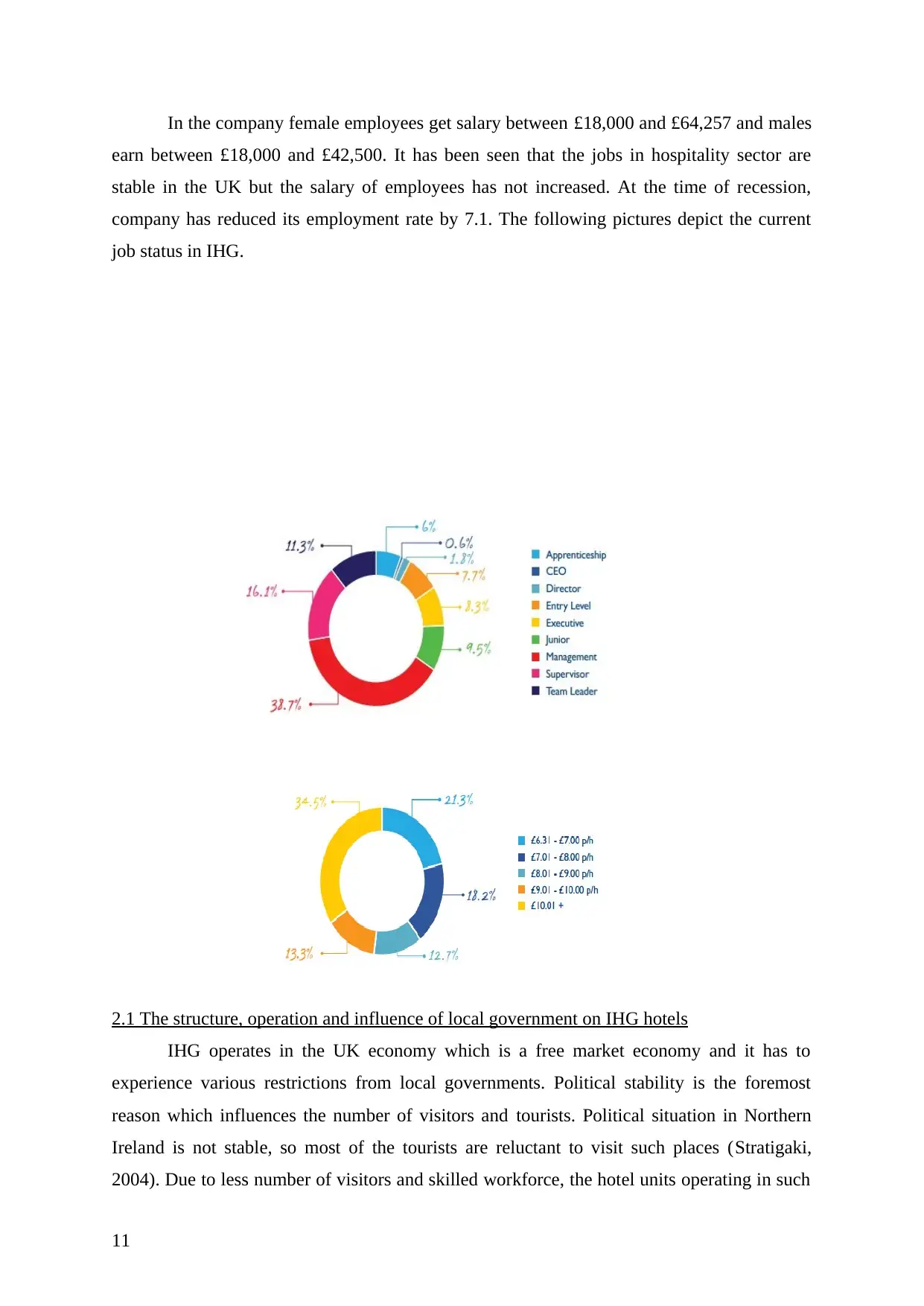
In the company female employees get salary between £18,000 and £64,257 and males
earn between £18,000 and £42,500. It has been seen that the jobs in hospitality sector are
stable in the UK but the salary of employees has not increased. At the time of recession,
company has reduced its employment rate by 7.1. The following pictures depict the current
job status in IHG.
2.1 The structure, operation and influence of local government on IHG hotels
IHG operates in the UK economy which is a free market economy and it has to
experience various restrictions from local governments. Political stability is the foremost
reason which influences the number of visitors and tourists. Political situation in Northern
Ireland is not stable, so most of the tourists are reluctant to visit such places (Stratigaki,
2004). Due to less number of visitors and skilled workforce, the hotel units operating in such
11
earn between £18,000 and £42,500. It has been seen that the jobs in hospitality sector are
stable in the UK but the salary of employees has not increased. At the time of recession,
company has reduced its employment rate by 7.1. The following pictures depict the current
job status in IHG.
2.1 The structure, operation and influence of local government on IHG hotels
IHG operates in the UK economy which is a free market economy and it has to
experience various restrictions from local governments. Political stability is the foremost
reason which influences the number of visitors and tourists. Political situation in Northern
Ireland is not stable, so most of the tourists are reluctant to visit such places (Stratigaki,
2004). Due to less number of visitors and skilled workforce, the hotel units operating in such
11
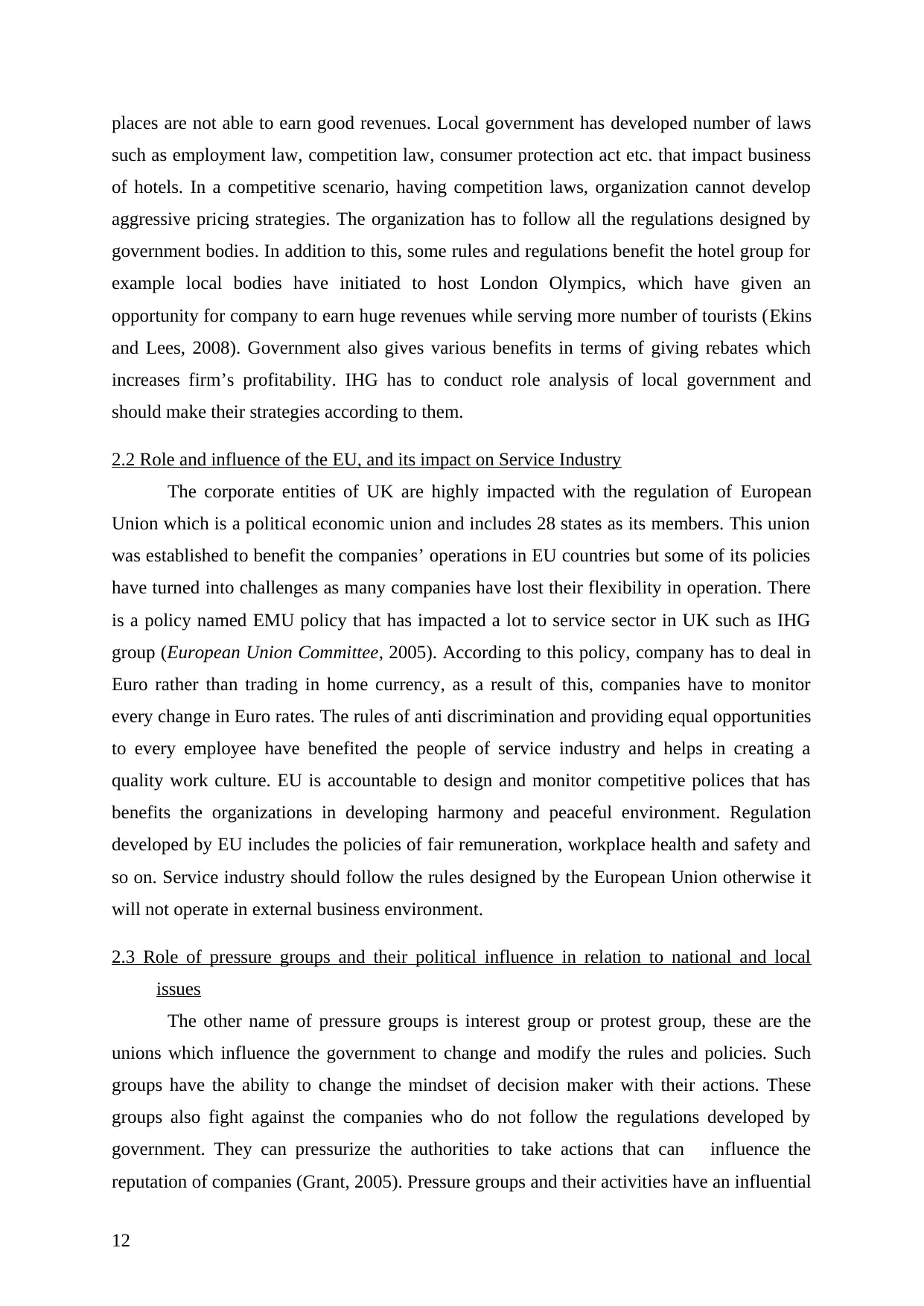
places are not able to earn good revenues. Local government has developed number of laws
such as employment law, competition law, consumer protection act etc. that impact business
of hotels. In a competitive scenario, having competition laws, organization cannot develop
aggressive pricing strategies. The organization has to follow all the regulations designed by
government bodies. In addition to this, some rules and regulations benefit the hotel group for
example local bodies have initiated to host London Olympics, which have given an
opportunity for company to earn huge revenues while serving more number of tourists (Ekins
and Lees, 2008). Government also gives various benefits in terms of giving rebates which
increases firm’s profitability. IHG has to conduct role analysis of local government and
should make their strategies according to them.
2.2 Role and influence of the EU, and its impact on Service Industry
The corporate entities of UK are highly impacted with the regulation of European
Union which is a political economic union and includes 28 states as its members. This union
was established to benefit the companies’ operations in EU countries but some of its policies
have turned into challenges as many companies have lost their flexibility in operation. There
is a policy named EMU policy that has impacted a lot to service sector in UK such as IHG
group (European Union Committee, 2005). According to this policy, company has to deal in
Euro rather than trading in home currency, as a result of this, companies have to monitor
every change in Euro rates. The rules of anti discrimination and providing equal opportunities
to every employee have benefited the people of service industry and helps in creating a
quality work culture. EU is accountable to design and monitor competitive polices that has
benefits the organizations in developing harmony and peaceful environment. Regulation
developed by EU includes the policies of fair remuneration, workplace health and safety and
so on. Service industry should follow the rules designed by the European Union otherwise it
will not operate in external business environment.
2.3 Role of pressure groups and their political influence in relation to national and local
issues
The other name of pressure groups is interest group or protest group, these are the
unions which influence the government to change and modify the rules and policies. Such
groups have the ability to change the mindset of decision maker with their actions. These
groups also fight against the companies who do not follow the regulations developed by
government. They can pressurize the authorities to take actions that can influence the
reputation of companies (Grant, 2005). Pressure groups and their activities have an influential
12
such as employment law, competition law, consumer protection act etc. that impact business
of hotels. In a competitive scenario, having competition laws, organization cannot develop
aggressive pricing strategies. The organization has to follow all the regulations designed by
government bodies. In addition to this, some rules and regulations benefit the hotel group for
example local bodies have initiated to host London Olympics, which have given an
opportunity for company to earn huge revenues while serving more number of tourists (Ekins
and Lees, 2008). Government also gives various benefits in terms of giving rebates which
increases firm’s profitability. IHG has to conduct role analysis of local government and
should make their strategies according to them.
2.2 Role and influence of the EU, and its impact on Service Industry
The corporate entities of UK are highly impacted with the regulation of European
Union which is a political economic union and includes 28 states as its members. This union
was established to benefit the companies’ operations in EU countries but some of its policies
have turned into challenges as many companies have lost their flexibility in operation. There
is a policy named EMU policy that has impacted a lot to service sector in UK such as IHG
group (European Union Committee, 2005). According to this policy, company has to deal in
Euro rather than trading in home currency, as a result of this, companies have to monitor
every change in Euro rates. The rules of anti discrimination and providing equal opportunities
to every employee have benefited the people of service industry and helps in creating a
quality work culture. EU is accountable to design and monitor competitive polices that has
benefits the organizations in developing harmony and peaceful environment. Regulation
developed by EU includes the policies of fair remuneration, workplace health and safety and
so on. Service industry should follow the rules designed by the European Union otherwise it
will not operate in external business environment.
2.3 Role of pressure groups and their political influence in relation to national and local
issues
The other name of pressure groups is interest group or protest group, these are the
unions which influence the government to change and modify the rules and policies. Such
groups have the ability to change the mindset of decision maker with their actions. These
groups also fight against the companies who do not follow the regulations developed by
government. They can pressurize the authorities to take actions that can influence the
reputation of companies (Grant, 2005). Pressure groups and their activities have an influential
12
⊘ This is a preview!⊘
Do you want full access?
Subscribe today to unlock all pages.

Trusted by 1+ million students worldwide
1 out of 22
Related Documents
Your All-in-One AI-Powered Toolkit for Academic Success.
+13062052269
info@desklib.com
Available 24*7 on WhatsApp / Email
![[object Object]](/_next/static/media/star-bottom.7253800d.svg)
Unlock your academic potential
Copyright © 2020–2026 A2Z Services. All Rights Reserved. Developed and managed by ZUCOL.





